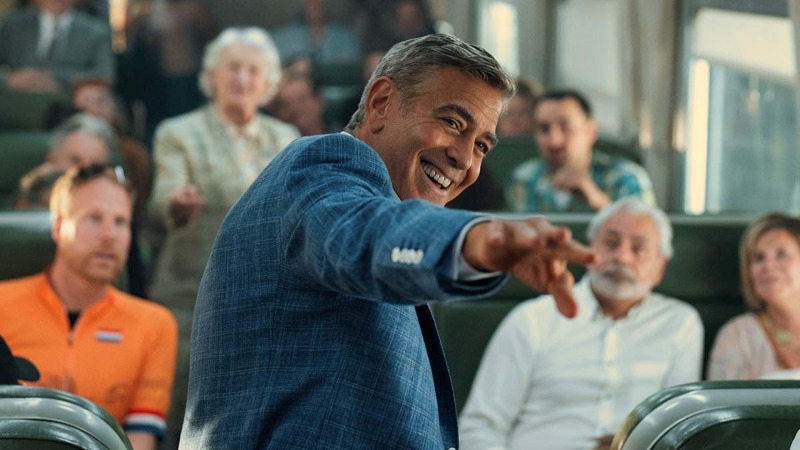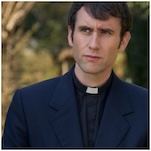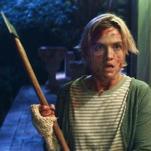NYFF: George Clooney Looks Back at a Fake Career in Noah Baumbach’s Jay Kelly

“I don’t want to be here anymore.” That’s the first line we hear recited in-character by Jay Kelly, a world-famous movie star about to finish his last day on the set of an unspecified movie, in the opening moments of Noah Baumbach’s Jay Kelly. Baumbach is a meticulous writer, and often pays precise attention to the lines that open and close his films, even if it seems naturalistic at first. (“Are you gonna let me in?” Greta Gerwig murmurs rhetorically to a fellow driver at the outset of Greenberg, and it echoes throughout the movie’s discomfiting romance.) But Baumbach has also been pushing himself as a director with some Netflix money behind his recent, ambitious projects, and that Jay Kelly line arrives during a lengthy, shadow-dancing tracking shot around the movie’s set, catching snatches of conversation (another Baumbach specialty) before landing on Kelly actually doing his last few takes. In a single dazzling sequence, the movie lays out the elaborate fakeness that’s constructed to orbit around its central star, however temporarily.
And getting more temporary all the time. A star of Jay Kelly’s age on Jay Kelly’s supposed level of fame and adulation feels like a cosmic anomaly or maybe even an anachronism. This, despite the characters’ verbal acknowledgments of the diminished global market for matinee idols; despite even the presence of real-life Last Movie Star George Clooney in the Kelly role. Baumbach, who has raised self-consciousness to an art form as well as an epic subject, anticipates what you might be thinking about this, too, and has Kelly and others talk about what it really means to “play yourself,” rebuking a common dismissal of movie-star artistry.
The self-referentiality doesn’t end there. Much later, when we see clips from throughout Jay Kelly’s career, the montage is made up of real Clooney projects. (What else could it be?) These winking acknowledgments may still result in Clooney not receiving due credit for his work. In the broad strokes, Jay Kelly is a Clooneyish star, sure. Looking closer, though, he’s more of a 60ish fiction extrapolated from the earlier days of Clooney’s movie career. That’s also why he feels especially anachronistic: It’s as if movies like One Fine Day and The Peacemaker (the latter heavily featured in the Kelly montage, if I’m not mistaken) became signature smashes, and Clooney never branched out into socially-conscious directing or the elder-statesman gravitas to understand his slow, natural fade. Jay Kelly turns the Clooney charm into something more plastic and pliable, a mask he may not be able to remove. Panicking as his younger daughter Daisy (Grace Edwards) prepares to leave for college, reeling with barely-expressed grief and a little regret following the death of his early-career director and mentor Peter Schneider (Jim Broadbent), Kelly flirts with leaving the business entirely – while still rehearsing saying his name into the mirror, as if attempting to get a bead on his genuine self.
It’s in this headspace that Kelly belatedly agrees to accept a tribute in Italy, hoping to lure the Eurotripping Daisy out to see him accept his trophy. (Baumbach makes sure characters mention the actual crafting of the trophy, emphasizing how this honor, too, is meticulously produced fakeness.) He invites his disapproving father (Stacy Keach) and semi-estranged older daughter Jessica (Riley Keough), too, and strong-arms his manager and de facto best friend Ron (Adam Sandler) into joining the trip, which involves an unnecessarily lengthy train ride. Kelly is attempting to assemble a makeshift family-meets-entourage, seemingly hoping that will supplement the movie montage and give his life some additional dimension. It has the opposite effect – on Jay, and on the movie itself. Baumbach started his career directing a superb comic ensemble in Kicking and Screaming; Jay Kelly is not that, very much by design, but his assemblage of clutch players (which also includes past collaborators Laura Dern and Greta Gerwig!) still feels scattered and diffuse. I could have watched an entire movie about the loving, privileged, yet semi-stressed relationships between Ron, his wife Lois (Gerwig), and their daughter (Sandler’s real-life kid Sadie). Instead, they provide a few not-quite grace notes for a story that isn’t really about Jay and Ron’s dysfunctional friendship – another storyline that could have been a killer focus for a whole movie.
-

-

-

-

-

-

-

-

-

-

-

-

-

-

-

-

-

-

-

-

-

-

-

-

-

-

-

-

-

-

-

-

-

-

-

-

-

-

-

-








































